1. How and when did DePaul University come into existence?
Our founding goes back to a time when Vincentian priests, who administered St. Vincent de Paul parish in Chicago, were asked to open a college to help serve those young men and women who were being denied entrance entrance at other local universities because to religious quotas. Since the members of the Congregation of the Mission saw access to education as a means of getting out of poverty, this request was in accord with the Congregation’s mission and helped meet an urgent need of the day. St. Vincent’s College was established in 1898, and in 1907, St. Vincent’s College was named “DePaul University” in honor of our founder, Vincent de Paul.
Historically, DePaul is recognized for being an institution that responds to the signs of the times and has consistently reached out to and served those individuals from underserved and underrepresented communities.
DePaul became the first Catholic university in the United States to offer an education to both men and women … this was done over 100 years ago. DePaul began as a college for sons and daughters of immigrants and remains committed to this population, though the countries of origin have changed. DePaul changed its policies that led to exclusion of Black students after World War II and began enrolling them in sizeable numbers thereafter. DePaul has never had religious quotas for non-Catholics and has had an interreligious approach since its early days. Diversity is front and center of our Vincentian respect for the dignity of every person and at the heart of our university mission.
2. What is the mission and the link with St. Vincent de Paul and therefore the Vincentian Family?
DePaul’s mission statement, distinguishing characteristics, core values and commitments can be found here. Our mission statement begins with our Vincentian identity, “As an innovative Catholic, Vincentian university anchored in the global city of Chicago…,” and our Vincentian legacy is very much active in our university today. The centrality of our Vincentian heritage can be seen as one of our fundamental distinguishing characteristics: “Motivated by the examples of Vincent de Paul and Louise de Marillac, who instilled a love of God by leading their contemporaries to serve urgent human needs, the DePaul community believes our mission as an educational institution is to foster integral human development, social mobility, and social transformation.”
I believe that Vincent, Louise, Frederic and other Vincentians are present in the minds and actions of many in our community today. Certainly, our institutional name is a constant reminder of Vincent de Paul. Incoming students, faculty and staff are made aware of the Vincentian mission and identity, and you can see references to it throughout the institution. One of our deeply held values is that of providing access to a college education for underserved communities, which is a challenge in the U.S. higher educational and economic landscape. It is our Vincentian mission that keeps us grounded in creatively doing this work and seeking to maintain what we call “Vincentian personalism” in treating every person with dignity and respect even as our institution has grown.
Particularly over the past 15-20 years, DePaul has been educating the community on our university’s connection to the wider Vincentian Family. My area, the Division of Mission and Ministry (DMM), has been intentional about creating service immersion trips and local service opportunities with Vincentian family partners in the U.S. and Latin America. We sponsor Vincentian Family speakers and have regular programming like “Dinner with the Daughters” where students can meet the Daughters of Charity.
We participate in the Vincentian Mission Institute, a collaborative cohort program with senior leaders from the three Vincentian universities in the United States—Niagara University, St. John’s University, and DePaul University – which has helped senior leaders at DePaul connect with family members and see DePaul as one Vincentian institution among many. Our regular Vincentian Heritage trips help faculty, staff, and students connect to the broader Vincentian heritage and family. Academically we have partnered with Vincentian family members on projects around the world and are seeking to build even more connections, most recently with confreres in India. DePaul now houses the Institute of Global Homelessness, a partnership with our university and Depaul International (London, UK),
As part of its institutional commitment to the Vincentian Heritage, DMM also houses the Vincentian Studies Institute, whose purpose is to promote interest in the historical, spiritual and charitable heritage of the Vincentian family. The goal of this Institute is to serve as the premier international site for Vincentian Studies, and has one of the largest repositories of Vincentian academic works both online and in the University’s Special Collections. We understand that as a Vincentian university we have a responsibility to contribute to the larger Vincentian Family through the reinterpretation of the Vincentian mission and charism for the present times. Through the Vincentian Heritage e-journal and other publications, we want to contribute to reflections on topics like new forms of poverty, modern forms of slavery, systemic change, social mobility, breaking transgenerational cycles of poverty, and political advocacy. As Pope Francis emphasized in the Global Compact on Education, we see the role of our educational institution as one of advancing the agenda of the common good, the agenda of a sustainable world, the agenda of social and environmental justice, the agenda of human rights – always within the framework of the Catholic intellectual tradition.
3. How many and who are your students? What is their profile?
While our enrollment fluctuates somewhat, I will share the most recent figures from 2020. DePaul has nearly 22,000 undergraduate and graduate students, and our students are very diverse. I do not think I can say what a “typical” student profile is. Not being able to make such generalizations is the profile of a DePaul student!
I would like to say that DePaul is a small reflection of the growing diversity and mixture of cultures that is happening in our world at an incredibly rapid pace due to the advancements of humanity in communications, transportation systems, etc. as well as due to displacement and migration. For us at DePaul, we live under one ethical imperative: the inseparable relationship between the individual dignity of every human person and the full embrace of all forms of diversity in the heart of our humanity.
Let me share some statistics about our students that might be of interest. Of last year’s freshman class, 34% were the first in their families to attend college, 32% were underrepresented students of color, and 32% were Pell eligible (have a high degree of unmet financial need). School-wide, students of color account for 43% of total enrollment and international students comprise 5% of total enrollment.
These facts are important as we seek to have an inclusive and equitable student body, but let me share with you my impression of DePaul students after having worked with them off and on in several roles over many years. Students who come to DePaul tend to have initiative. They want to live in a big city and go to a big school that is known for being pragmatic. They want to change the world. At least 60% of our students do internships while enrolled, many have jobs (often multiple jobs) while juggling classes and family responsibilities, and many are from modest or impoverished means. The level of diversity at DePaul leads students to experience the Vincentian mission.
We also seek to make contemplation and reflection a deeper part of the student experience. I have known many students passionate about social justice and community service and they are well served by the intentionality of Vincentian reflection through models we have developed like VIA (Vincentians in Action). At DePaul, we do not have a championship football team, but we do have our annual Vincentian Service Day in which 1000 people do service throughout the city of Chicago – or for the past two events, virtually.
4. What are the most developed didactic areas? What is the challenge you face as a Catholic university?
DePaul is a rather innovative place and seeks to be responsive to the signs of the time. Our College of Computing and Digital Media is known for its real-world education, instructors, and work experiences and reflects a pragmatism on the part of our students. Yet DePaul retains a strong liberal arts college and has core coursework requirements for all students. We have many centers that serve the community – such as various legal clinics, a behavioral health clinic, the Egan Office For Urban Education & Community Partnerships – through which students and faculty/staff provide direct service to those in need, enabling students to apply what they are learning in the classroom.
In following in the footsteps of Vincent de Paul, our approach to the Catholic experience is based on the three basic narratives of the Christian experience: the mystical narrative, the prophetic, and the narrative of communion. We want to contribute today to the conversion of the Church and the profound reformation that Pope Francis has introduced in his teachings and new structures he is creating, and we want to assume seriously his call for pastoral conversion and ecological conversion, and a relational (synodal) conversion.
In the Vincentian spirit, we use Louise de Marillac’s question: “Where is the classroom?” But we expand that question to ask, “Who is in the classroom? What is happening in the classroom? Is this classroom connected with reality? In what ways?” In our pedagogical approach, we intentionally connect the classroom with the community. Experiential and intellectual learning are two competences of our pedagogical framework. We hope that the wisdom that comes from academic resources is profoundly connected to the wisdom that comes from the streets, and that our students find a role in creating new wisdom that will be expressed in new theories and that will be applied in the world beyond our campus.
We want to educate human beings who evolve to find their best selves and then express themselves through the way they engage in transformational actions in whatever fields they pursue.
The challenges we face as a Catholic university are probably similar to those faced by many other Catholic institutions. These include the high cost of education that must be balanced with a mission to provide access for underserved students, a rise in a consumerist culture that is also becoming more polarized, and that more and more students are leaving their faith communities or are simply being raised without any faith tradition – so what does a “faith-based school” mean to them? In some ways, though, I think DePaul is very well positioned through its own history to meet these challenges. We have always been an interfaith-supportive university. DePaul provides a space for diverse religions and worldviews because of our Catholic identity. Our Vincentian commitment to upholding the dignity of every person has led DePaul to be institutionally supportive of LGBTQIA+ and other groups previously mentioned as a natural outgrowth of our Catholic Vincentian mission. Students perceive authenticity in seeing the value of every human person, which is especially important to young people today – and we are not perfect, so they use our own mission and values to hold our feet to the fire when we fall short.
5. Do you have a motto or a phrase that characterizes you?
DePaul’s official motto is Viam sapientiae monstrabo tibi (I will show you the way of wisdom). But that is not the only phrase that characterizes our university. DePaul is profoundly pragmatic. In this, we follow the leadership of our students. They are tired of empty theories. They find God, meaning, and connection in their hands and feet. They say from their heart, “Here we do.” This has been adopted as a current slogan of our university. https://www.youtube.com/watch?v=l9trK-hZR5c
Elena Grazini
- Students attend the class “Introduction to the Art and Science of Nursing,” taught by Susana Gonzalez, Thursday, Sept. 24, 2020, in the 990 Fullerton building on the Lincoln Park Campus. (DePaul University/Jeff Carrion)
- Students attend the class “Introduction to Comparative Politics,” taught by Richard Farkas, Thursday, Sept. 24, 2020, in Arts and Letters Hall on the Lincoln Park Campus.
- Susana Gonzalez, adjunct faculty in the College Science and Health, teaches the class “Introduction to the Art and Science of Nursing,” Thursday, Sept. 24, 2020, in the 990 Fullerton building on the Lincoln Park Campus. (DePaul University/Jeff Carrion)
- Richard Farkas, professor in the College of Liberal Arts and Social Sciences, teaches the class “Introduction to Comparative Politics,” Thursday, Sept. 24, 2020, in Arts and Letters Hall on the Lincoln Park Campus.
- A CTA train rushes by Wish Field, Thursday, Jan. 21, 2021, on the Lincoln Park Campus. (DePaul University/Randall Spriggs)
- DePaul students Vasudra Saraswat, left, and Cassie Edet learn folding tips from In-Christ Leader Montrice Hardaway as they make beds at the Pacific Garden Mission, a community refuge for those seeking shelter, food, clothing and medical care in Chicago’s South Loop, as part of Vincentian Service Day, Saturday, May 7, 2016. Each year, hundreds of DePaul students participate in community service projects across the city on Vincentian Service Day.
- DePaul student Hunter Ansorage helps fold linens at the Pacific Garden Mission, a community refuge for those seeking shelter, food, clothing and medical care in Chicago’s South Loop, as part of Vincentian Service Day, Saturday, May 7, 2016. Each year, hundreds of DePaul students participate in community service projects across the city on Vincentian Service Day.
- Members of DePaul’s men’s golf team volunteers at the Lincoln Park Community Shelter, cleaning and organizing their kitchen, Saturday, May 6, 2017, during the 19th annual Vincentian Service Day. More than 1,500 students, staff, faculty and alumni fanned out across the Chicagoland area to volunteer at community organizations during the annual day of service. Vincentian Service Day (VSD) began in 1998 as part of DePaul’s Centennial celebration and 2017 marks the 400th anniversary of the Vincentian Mission. (DePaul University/Arielle Toub)
- DePaul University 1L law students and local youth volunteers help clean up litter around Marillac St. Vincent Family Services in the East Garfield Park neighborhood on Chicago’s west side. Students, faculty and staff from DePaul University’s College of Law participated in its 4th Annual 1L Service Day Friday, August 21, 2015. The event was a chance for DePaul College of Law’s incoming 1Ls to get to know fellow classmates and DePaul faculty and staff while volunteering in the community. (DePaul University/Jeff Carrion)
- DePaul students, staff and faculty gather at the Ray Meyer Fitness and Recreation Center on DePaul’s Lincoln Park Campus for the annual Vinny Fest, Friday, Sept. 27, 2019. The carnival-like event featured prizes and trivia games that highlighted the life of St. Vincent de Paul, the Vincentian mission and the school’s “name above the door.” (DePaul University/Randall Spriggs)
- Students prepare for the autumn quarter by participating in DePaul University’s first student convocation at the Wintrust Arena, Tuesday, Sept. 10th, 2019 near DePaul’s Loop Campus.
- College of Law Commencement May, 2019 (DePaul University/Jeff Carrion)
- Advocates from across the globe discuss the challenges they face fighting homelessness, Monday, Nov. 5, 2018, during an international conference hosted by the Institute of Global Homelessness at DePaul University. The weeklong IGH Leadership Symposium sup
- Josephine Esteban, Gisselle Cervantes, A. Gabriel Esteban, president of DePaul, and Jack Evans pose for a photo on the Lincoln Park Campus Quad, Friday, Sept. 28, 2018, during the annual Vinny Fest. Cervantes and Evans were portraying Louise de Marillac a

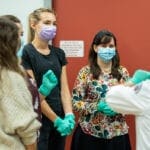
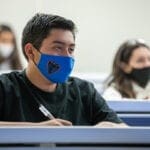
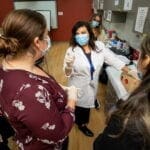


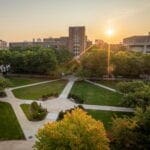
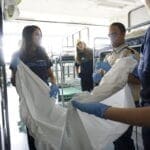





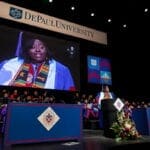
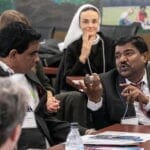
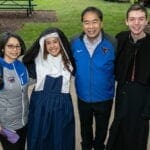




0 Comments